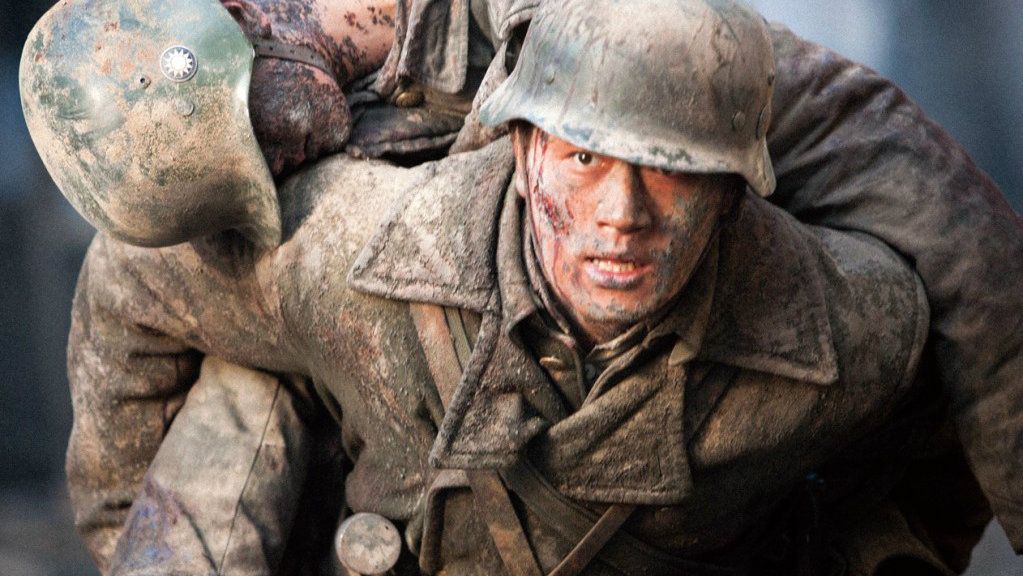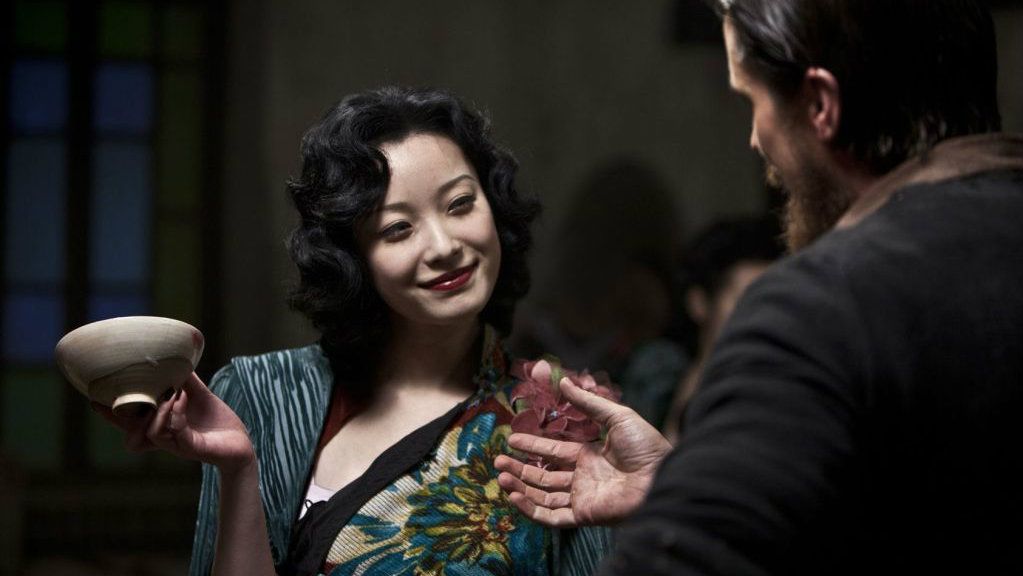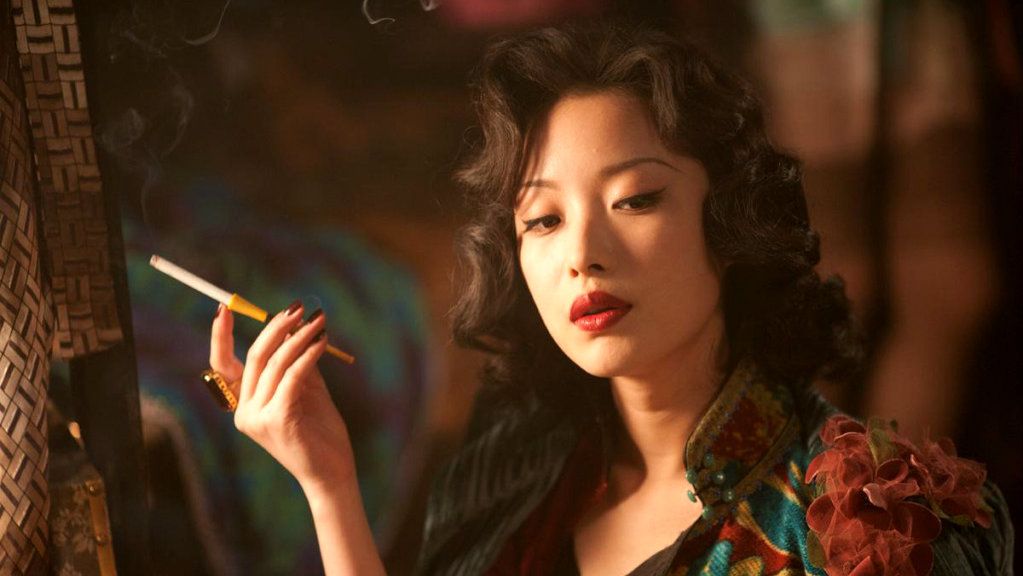Nothing goes without a hitch when you're in China. In case you didn't know, I indeed happen to be in China right now (have been for seven-something weeks), and just came to discover that even writing a post about a film is easier said than done. I haven't been watching too many films lately, thanks to this damn country and my busy and tiring schedule. However, today I saw a film that I liked, and what is more, felt inspired to maybe even write a post about it. Hurray, right? And it was a Chinese film, too.
Well, I wrote half of the title to the post and then checked the film's IMDb page. I noticed the original name of the film is Jin líng shí san chai. 'I wonder how that translates to English', I thought. 'I have to check that out!' Well. Easier said than done. Google Translator doesn't cooperate with me right now, so I've been forced to use other means.
I've been sitting here for a half an hour now, and this is what I've found out: Jinlíng is what they used to call the Western part of Nanjing - the city where the film is set (and Nanjing was called Nanking at the time of the film's events... Make up your mind, will you?). Shí san is thirteen. That one I actually concluded by myself, as my enormous knowledge about the Chinese language includes numbers from one to ten. Sure, I couldn't be certain, because then again, shì also means 'be', and several other things, so I couldn't be sure about it before I saw the film's title written in Chinese characters (金玲十三钗 : the third symbol means ten and the fourth three (and that's pretty much all the symbols I recognize... I'm pathetic)). So, 'Nanjing thirteen'. What about chai? (Before I had time to do more research I had to go and have dinner, and sleep and then go to work. New day, more research.) One meaning I found was 'hairpin'. Well, that doesn't make any sense. Then I finally found it! Chai can also mean 'beauty', as it did in an ancient Chinese novel 'Dream of the Red Chamber'; the main characters are referred to as 'the Twelve Beauties of Jinlíng'. Bingo!
So. The name, Jin líng shí san chai, or The Thirteen Beauties of Jinlíng, is a modification based on the characters of the 18th century novel. Why thirteen? If you've seen the film, you'll know.
...Now, do you see what I mean? Saying that everything, everything is easier said than done when you're in China? Jeez. Well, since I now know what the film I just saw is called (or think I do; it's possible that the title translates to something completely different), maybe now I can move on and actually start talking about it. Or at least approach the point when I do.
I hadn't heard about this film before a friend of mine mentioned it when I was talking to her on Skype. Maybe I had come across it before; I did a lot of research (=googling) on films made and set in China before I came here. If so, I probably just pushed it aside immediately, because of Christian Bale (not the biggest fan of the actor). But as my friend described the film in a few words ("The Japanese attack a Chinese city and kill a bunch of people..."), I thought, 'Hey, sounds kind of familiar'. I'm actually just reading a book about it. So screw my dislike on Christian Bale and screw the running time that is too long for my taste (two and a half hours). I had to see the film!
The Nanking Massacre, or the Rape of Nanking, is what they call a six-week-period that took place in the Chinese capital at the time, in December 1937, when the Japanese troops violently took over the city, mindlessly killing, torturing and raping. Cheery, right? It's only natural that I've taken interest in it...
(Okay, NOW, let's get to the point.) In The Flowers of War Christian Bale plays a jackass American, who finds himself taking refuge in a Catholic church, with some school girls and a group of local prostitutes. (Yesterday I was describing the plot similarly to another friend and I realized it kind of sounds like the beginning of some high-budget adult movie...) The hard way they learn to work together, to try and escape from the Japanese surrounding them.
I really liked the film. Sure, it was a tiny bit too long, and yeah, Christian Bale still puts me off a little, and yes, some scenes were too graphic for my taste. And yeah, whenever there's a film like this, with two countries at war, and the story is told from a specific point of view (so it's taking a side), I wish they wouldn't show the "enemy" as 100 % evil; because they never are. Like in most good Holocaust movies there is always one good Nazi: in The Pianist there's that poor little soldier who has a shitty end, and in Schindler's List there's Schindler, and so on. (And by the way - true story! - the Nanking Massacre they had their very own Schindler: a Nazi called John Rabe who helped establish a safety zone to save innocent civilians.) I'm not saying we should sympathize Nazis, but nothing is black and white. In The Flowers of War the Japanese are evil, barbaric, cruel, soulless. Period. Of course, you can't tell this particular story with the Japanese as the good guys. But the film was shamelessly, 100 % anti-Japanese. Maybe it has to do with the relationship between China and Japan. I guess, even today, not everything that happened in the past has been forgiven...
I ramble. News?

Like I was saying, I really did like the movie. Here's something that I liked about it:
I understood some of the Chinese! Like two words, tops, but still! And I was able to tell Japanese and Chinese apart! Success!
There were so many women! Haha. Okay. Even though the main character is a man, and the story was told pretty much from his point of view, but he is surrounded by strong female characters. And the interaction and solidarity between the girls and the women is much much more interesting than the boringly predictable love story.
How the atmosphere was just dark enough. With lighter, funnier, more encouraging scenes sprinkled here and there. It was all in good balance. Of course, the overall tone of the film was dark, and sure it doesn't leave you with a smile on your face, but they had found some natural ways to lighten up the horrible context the characters lived in.
The film had some very nice and elaborative cinematography. At times I just wanted to freeze the picture, because they would've made such beautiful works of art to put on the wall. And the slow motion. Haha. I like slow motion. And Chinese women are so beautiful! Maybe next time when a Chinese woman or girl comes to me and communicates that she's ugly and yellow, and I'm so beautiful, I'll just give them a mirror and ask them to take another look.
I must say I kind of even liked Christian Bale in this. Or maybe I just liked Christian Bale for doing this. I mean, not many Hollywood actors have worked in an all-Chinese films in the past. I guess I just appreaciate his bold choice of doing something unusual. Bale says he also enjoyed working in China, as the only Westerner in the cast, but good old China just might ruin its chances of ever getting him back there; apparently he showed too much interest in potentially meddling with China's domestic politics, as he attempted to visit a human rights activist. So he might not be allowed to return. Lovely.
The Flowers of War is based on a novel by Yan Geling. I want to read it! And other books she's written. (I had to check whether she's a she or a he. These Chinese names all sound the same to me. (Although, speaking of Chinese names, I have to point out the sophistication and knowledge I show when writing the Chinese names in this post. For example, even though on IMDb it reads 'Xinyi Zhang', I knew better and wrote 'Zhang Xinyi', because that's how it would be written in China: family name first, because family is considered more important than an individual (at least that's what one of my China books said, and I read those like the Bible...))).
I should also watch more Chinese movies. Going to see a Chinese film in a cinema here would be so great, but I'm afraid these people are not familiar with the concept of English subtitles, at least not in Shenyang. So, unfortunately seeing a Chinese film here would be too much of a challenge, unless the dialogue of the film consisted of saying hello, thank you, bottoms up, and repeating the numbers from one to ten. And I don't think I'd pay to see that film.
Well. I ended up writing less about The Flowers of War and more about everything else, but no one should even try acting surprised.
How the atmosphere was just dark enough. With lighter, funnier, more encouraging scenes sprinkled here and there. It was all in good balance. Of course, the overall tone of the film was dark, and sure it doesn't leave you with a smile on your face, but they had found some natural ways to lighten up the horrible context the characters lived in.
The film had some very nice and elaborative cinematography. At times I just wanted to freeze the picture, because they would've made such beautiful works of art to put on the wall. And the slow motion. Haha. I like slow motion. And Chinese women are so beautiful! Maybe next time when a Chinese woman or girl comes to me and communicates that she's ugly and yellow, and I'm so beautiful, I'll just give them a mirror and ask them to take another look.
I must say I kind of even liked Christian Bale in this. Or maybe I just liked Christian Bale for doing this. I mean, not many Hollywood actors have worked in an all-Chinese films in the past. I guess I just appreaciate his bold choice of doing something unusual. Bale says he also enjoyed working in China, as the only Westerner in the cast, but good old China just might ruin its chances of ever getting him back there; apparently he showed too much interest in potentially meddling with China's domestic politics, as he attempted to visit a human rights activist. So he might not be allowed to return. Lovely.
The Flowers of War is based on a novel by Yan Geling. I want to read it! And other books she's written. (I had to check whether she's a she or a he. These Chinese names all sound the same to me. (Although, speaking of Chinese names, I have to point out the sophistication and knowledge I show when writing the Chinese names in this post. For example, even though on IMDb it reads 'Xinyi Zhang', I knew better and wrote 'Zhang Xinyi', because that's how it would be written in China: family name first, because family is considered more important than an individual (at least that's what one of my China books said, and I read those like the Bible...))).
I should also watch more Chinese movies. Going to see a Chinese film in a cinema here would be so great, but I'm afraid these people are not familiar with the concept of English subtitles, at least not in Shenyang. So, unfortunately seeing a Chinese film here would be too much of a challenge, unless the dialogue of the film consisted of saying hello, thank you, bottoms up, and repeating the numbers from one to ten. And I don't think I'd pay to see that film.
Well. I ended up writing less about The Flowers of War and more about everything else, but no one should even try acting surprised.



No comments:
Post a Comment